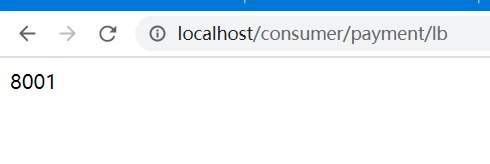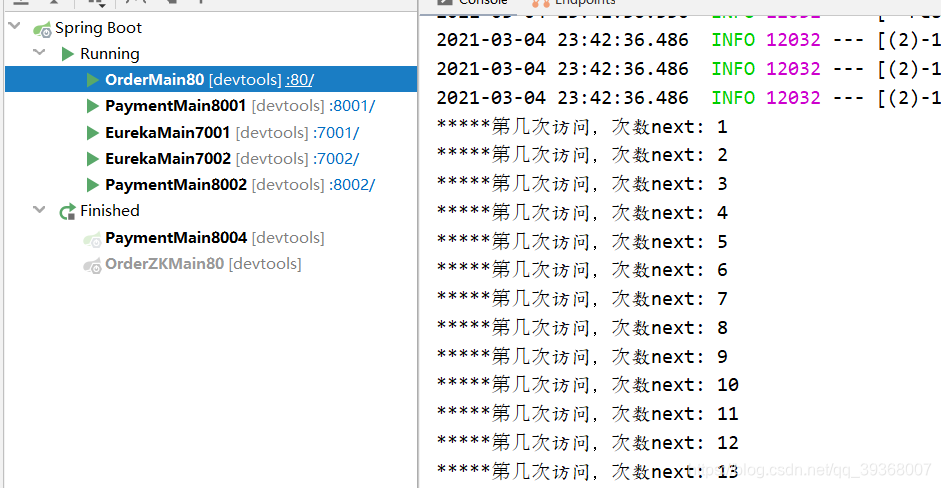

RoundRobinRule.java 源码剖析
/*
*
* Copyright 2013 Netflix, Inc.
*
* Licensed under the Apache License, Version 2.0 (the "License");
* you may not use this file except in compliance with the License.
* You may obtain a copy of the License at
*
* http://www.apache.org/licenses/LICENSE-2.0
*
* Unless required by applicable law or agreed to in writing, software
* distributed under the License is distributed on an "AS IS" BASIS,
* WITHOUT WARRANTIES OR CONDITIONS OF ANY KIND, either express or implied.
* See the License for the specific language governing permissions and
* limitations under the License.
*
*/
package com.netflix.loadbalancer;
import com.netflix.client.config.IClientConfig;
import org.slf4j.Logger;
import org.slf4j.LoggerFactory;
import java.util.List;
import java.util.concurrent.atomic.AtomicInteger;
/**
* The most well known and basic load balancing strategy, i.e. Round Robin Rule.
*
* @author stonse
* @author Nikos Michalakis <[email protected]>
*
*/
public class RoundRobinRule extends AbstractLoadBalancerRule {
private AtomicInteger nextServerCyclicCounter;
private static final boolean AVAILABLE_ONLY_SERVERS = true;
private static final boolean ALL_SERVERS = false;
private static Logger log = LoggerFactory.getLogger(RoundRobinRule.class);
public RoundRobinRule() {
nextServerCyclicCounter = new AtomicInteger(0);
}
public RoundRobinRule(ILoadBalancer lb) {
this();
setLoadBalancer(lb);
}
public Server choose(ILoadBalancer lb, Object key) {
if (lb == null) {
log.warn("no load balancer");
return null;
}
Server server = null;
int count = 0;
while (server == null && count++ < 10) {
List<Server> reachableServers = lb.getReachableServers();
List<Server> allServers = lb.getAllServers();
int upCount = reachableServers.size();
int serverCount = allServers.size();
if ((upCount == 0) || (serverCount == 0)) {
log.warn("No up servers available from load balancer: " + lb);
return null;
}
int nextServerIndex = incrementAndGetModulo(serverCount);
server = allServers.get(nextServerIndex);
if (server == null) {
/* Transient. */
Thread.yield();
continue;
}
if (server.isAlive() && (server.isReadyToServe())) {
return (server);
}
// Next.
server = null;
}
if (count >= 10) {
log.warn("No available alive servers after 10 tries from load balancer: "
+ lb);
}
return server;
}
/**
* Inspired by the implementation of {@link AtomicInteger#incrementAndGet()}.
*
* @param modulo The modulo to bound the value of the counter.
* @return The next value.
*/
private int incrementAndGetModulo(int modulo) {
for (;;) {
int current = nextServerCyclicCounter.get();
int next = (current + 1) % modulo;
if (nextServerCyclicCounter.compareAndSet(current, next))
return next;
}
}
@Override
public Server choose(Object key) {
return choose(getLoadBalancer(), key);
}
@Override
public void initWithNiwsConfig(IClientConfig clientConfig) {
}
}





LoadBalancer.java
package com.dym.springcloud.lb;
import org.springframework.cloud.client.ServiceInstance;
import java.util.List;
public interface LoadBalancer
{
ServiceInstance instances(List<ServiceInstance> serviceInstances);
}
MyLB.java
package com.dym.springcloud.lb;
import org.springframework.cloud.client.ServiceInstance;
import org.springframework.stereotype.Component;
import java.util.List;
import java.util.concurrent.atomic.AtomicInteger;
@Component
public class MyLB implements LoadBalancer
{
private AtomicInteger atomicInteger = new AtomicInteger(0);
public final int getAndIncrement()
{
int current;
int next;
do {
current = this.atomicInteger.get();
next = current >= 2147483647 ? 0 : current + 1;
}while(!this.atomicInteger.compareAndSet(current,next));
System.out.println("*****第几次访问,次数next: "+next);
return next;
}
//负载均衡算法:rest接口第几次请求数 % 服务器集群总数量 = 实际调用服务器位置下标 ,每次服务重启动后rest接口计数从1开始。
@Override
public ServiceInstance instances(List<ServiceInstance> serviceInstances)
{
int index = getAndIncrement() % serviceInstances.size();
return serviceInstances.get(index);
}
}
OrderController.java
package com.dym.springcloud.controller;
import com.dym.springcloud.entities.CommonResult;
import com.dym.springcloud.entities.Payment;
import com.dym.springcloud.lb.LoadBalancer;
import lombok.extern.slf4j.Slf4j;
import org.springframework.cloud.client.ServiceInstance;
import org.springframework.cloud.client.discovery.DiscoveryClient;
import org.springframework.http.ResponseEntity;
import org.springframework.web.bind.annotation.GetMapping;
import org.springframework.web.bind.annotation.PathVariable;
import org.springframework.web.bind.annotation.RestController;
import org.springframework.web.client.RestTemplate;
import javax.annotation.Resource;
import java.net.URI;
import java.util.List;
@RestController
@Slf4j
public class OrderController
{
//public static final String PAYMENT_URL = "http://localhost:8001";
public static final String PAYMENT_URL = "http://CLOUD-PAYMENT-SERVICE";
@Resource
private RestTemplate restTemplate;
@Resource
private LoadBalancer loadBalancer;
@Resource
private DiscoveryClient discoveryClient;
@GetMapping("/consumer/payment/create")
public CommonResult<Payment> create(Payment payment)
{
return restTemplate.postForObject(PAYMENT_URL +"/payment/create",payment,CommonResult.class);
}
@GetMapping("/consumer/payment/get/{id}")
public CommonResult<Payment> getPayment(@PathVariable("id") Long id)
{
return restTemplate.getForObject(PAYMENT_URL+"/payment/get/"+id,CommonResult.class);
}
@GetMapping("/consumer/payment/getForEntity/{id}")
public CommonResult<Payment> getPayment2(@PathVariable("id") Long id)
{
ResponseEntity<CommonResult> entity = restTemplate.getForEntity(PAYMENT_URL+"/payment/get/"+id,CommonResult.class);
if(entity.getStatusCode().is2xxSuccessful()){
return entity.getBody();
}else{
return new CommonResult<>(444,"操作失败");
}
}
@GetMapping(value = "/consumer/payment/lb")
public String getPaymentLB()
{
List<ServiceInstance> instances = discoveryClient.getInstances("CLOUD-PAYMENT-SERVICE");
if(instances == null || instances.size() <= 0)
{
return null;
}
ServiceInstance serviceInstance = loadBalancer.instances(instances);
URI uri = serviceInstance.getUri();
return restTemplate.getForObject(uri+"/payment/lb",String.class);
}
}

